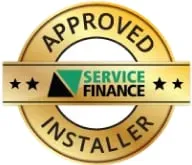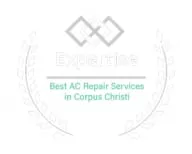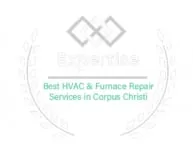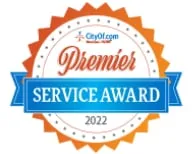COOLING
Emergency Air Conditioning Repair Service Corpus Christi
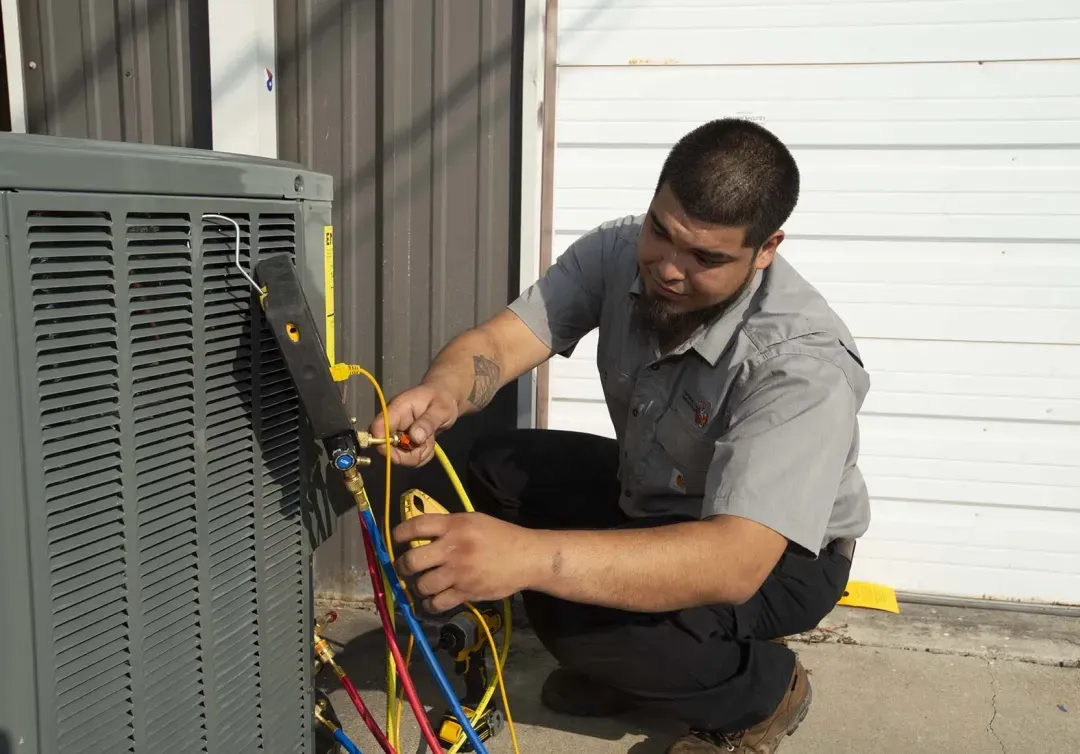
24/7 CORPUS CHRISTI AC REPAIR SERVICE
We all know how incredibly hot our Texas summers can be. If your AC stops working, you deserve it to be fixed right away. We know that you cannot wait until the next morning for your broken air conditioner to be repaired.
Don’t worry, just call us for 24-hour AC service, in Corpus Christi, TX or you can schedule a service online here: SCHEDULE SERVICE.
When to Call an AC Repair Technician
Air conditioning issues can arise unexpectedly, and knowing when to call a professional is key to maintaining your comfort. Here are some common signs that your AC might need attention:
Blowing Warm Air: If your AC is blowing warm or hot air, it may be due to low refrigerant or a compressor issue. A broken return duct could also be drawing in hot air from undesired areas.
Insufficient Airflow: This can occur when a fan motor fails, fan belt loosens, or blades are clogged with debris. Poor airflow means your home won’t cool properly, and it’s time to call in experts for a quick solution.
Frequent Cycles: Short-cycling, where the AC turns on and off erratically, indicates issues like low refrigerant, a leaky ventilation system, or a defective thermostat. Addressing these problems promptly can prevent further damage.
High Humidity: Excessive indoor humidity can lead to mold and discomfort. A professional can adjust fan speed, clean evaporator coils, or check refrigerant levels to help your AC manage humidity better.
Water Leaks: Water pooling around your AC often means a clogged condensate drain line. This issue can cause water damage and musty odors, so it’s vital to have it inspected.
Bad Smell: Musty odors from your AC are often due to sitting water, which can foster mold growth. Addressing these smells quickly prevents further complications.
Unusual Noises: Strange noises like buzzing can signal loose parts, compressor malfunctions, or refrigerant leaks. A professional inspection can identify and resolve these issues swiftly.
Don’t ignore these warning signs. Trust Tommy Cool Air to restore your comfort with our reliable, round-the-clock service, ensuring your system runs smoothly when you need it most.”
At Tommy Cool Air, we know heating and cooling system emergencies happen outside of our normal office hours. You are not able to predict or control when your cooling system may go out. We provide same day emergency air conditioning repair service.
Troubleshooting Steps for Common AC Problems
Troubleshooting Steps for Common AC Problems
Facing AC issues can be frustrating, especially when you’re not sure whether a service call is necessary. Before reaching out for professional help, consider these DIY troubleshooting steps:
1. Examine and Replace Air Filters
Dirty or clogged air filters can severely impact your AC’s performance.
- Tip: Regularly check and replace filters every 1-3 months, especially during peak usage times.
2. Adjust Thermostat Settings
Ensure your thermostat is set correctly and functioning as expected.
- Settings Check: Verify that it’s set to “cool” and that the temperature setting is lower than the room temperature.
3. Inspect the Circuit Breaker
Sometimes, the solution might be as simple as a flipped switch in your electrical panel.
- Action: Find your home’s main electrical panel and ensure the circuit breaker for the AC unit is in the “on” position.
4. Clear Debris from the External Unit
An untidy condenser can hinder airflow and reduce efficiency.
- Maintenance Tip: Periodically clean the area around your outside AC condenser, removing any debris, dirt, or obstructions.
5. Ensure Indoor Vents are Unobstructed
Blocked vents can disrupt airflow and cause uneven cooling.
- Quick Check: Walk through each room and confirm that all indoor vents are open and free from obstructions.
If these steps don’t solve the problem, it may be time to contact a certified HVAC technician for further assistance. Remember, many repair services are accessible 24/7 and can assist even on weekends and holidays.
How to Tell if Your Air Conditioner Needs Repair
When the summer heat is relentless, you want your air conditioner working seamlessly. Here are some telltale signs that your AC might be crying out for a professional fix.
Blowing Warm Air
If your unit is dispensing warm instead of cool air, it could be due to problems with the refrigerant levels or the compressor. Additionally, a disconnected or broken duct might be pulling warm air into your system.
Poor Airflow
Reduced airflow is often a result of a malfunctioning fan motor, a loose fan belt, or clogged blades. These issues can inhibit your system’s ability to circulate air, leaving your home less than comfortable. Professional technicians excel at diagnosing and resolving issues with insufficient airflow.
Irregular Cycles
An air conditioner that cycles on and off unpredictably, also known as short-cycling, could be suffering from several underlying issues. Common causes include:
- Refrigerant leaks
- Leaky vents
- Faulty thermostat
- Blocked air filters
- Incorrectly sized AC unit
Elevated Humidity
High indoor humidity can lead to mold and mildew, making your space uncomfortable. To enhance your unit’s dehumidifying capacity, consider having an expert adjust the fan speed, clean the evaporator coils, or check the refrigerant levels.
Water Leaks
Water puddling around your indoor unit often signals a blockage in the condensate drain line. This can result in water leakage, potential damage to your property, and increased indoor humidity levels.
Strange Odors
Unpleasant, musty smells emanating from your AC could indicate stagnant water, potentially leading to fungus or mildew growth in the system’s components. Addressing these odors promptly can prevent further complications.
Odd Noises
Unusual sounds like buzzing or rattling indicate possible mechanical issues. These could stem from a loose part, a problem with the compressor, or even a refrigerant leak. Early detection and repair can prevent more costly breakdowns.
Addressing these signs early can keep your air conditioning unit functioning efficiently, ensuring your comfort throughout the warmer months.
Why Might an Air Conditioner Blow Warm Air Instead of Cool Air?
When your air conditioner starts blowing warm air, it can be frustrating and uncomfortable, especially during hot weather. Here are some common reasons why this might happen:
1. Low Refrigerant Levels
Refrigerant is vital for cooling air. If your system is low on refrigerant due to a leak or insufficient filling during installation, it can lead to warm air output. This is because there isn’t enough refrigerant to absorb the heat and cool the air effectively.
2. Issues with the Compressor
The compressor is the heart of your AC system, responsible for pressurizing the refrigerant and circulating it through the system. A malfunctioning or broken compressor can disrupt this process, resulting in the inability to cool the air properly.
- Electrical problems: A failure in the electrical components could prevent the compressor from running efficiently.
- Wear and tear: Over time, normal wear and tear might lead to reduced functionality or failure.
3. Ductwork Problems
Ductwork is responsible for delivering cool air to various parts of your home. If there are leaks or if sections of the ductwork become disconnected, they could pull in warm air from unconditioned spaces like attics or crawl spaces. This can dilute the cool air with warm air, making it feel like the system is blowing warm air.
4. Thermostat Issues
At times, the culprit can be as simple as a thermostat setting. Make sure it’s set to “cool” mode and that the temperature is correctly adjusted. Faulty thermostats can also misread the home’s temperature, thus failing to trigger the cooling cycle of the air conditioner.
5. Dirty or Clogged Filters
Air filters trap dust and debris to keep your system running efficiently. Over time, these can become clogged, reducing airflow and causing the system to struggle, potentially resulting in warmer air being circulated.
Addressing these issues promptly can restore your AC to optimal performance, ensuring you stay cool when you need it most. For persistent problems, it’s wise to consult a professional HVAC technician.
How much do air conditioning repair services cost?
When determining the cost of air conditioner repairs, several key factors come into play.
Type of Repair Needed: The specific issue with your AC unit can significantly influence the overall cost. Simple fixes like replacing a filter might be inexpensive, while complex problems like compressor or refrigerant leaks can be more costly.
Warranty Status: If your AC unit is still under warranty, some repairs or parts replacements might be covered, reducing your out-of-pocket expenses.
Condition and Age of the Unit: Older units or those in poor condition may require more extensive repairs, adding to the overall cost. Newer systems might be simpler and less expensive to fix.
Complexity of the Repair: Some repairs are straightforward, while others are more intricate and time-consuming. The more complex the repair, the higher the labor costs.
Parts and Materials: The price and availability of necessary parts can vary. Specialty or rare components tend to be more expensive and may affect the repair timeline.
Labor Costs: Depending on the complexity of the issue and the technician’s expertise, labor costs can fluctuate. Professionals with specialized skills might charge more for their services.
After evaluating these elements through a thorough inspection and diagnosis, a detailed estimate is usually provided. This ensures transparency, so you understand upfront what to expect regarding costs—without surprise fees down the line.
What Are the Possible Causes of Water Leaks in an AC Unit?
Water leaks around your AC unit can indicate underlying issues that need attention. Here are some common culprits:
Faulty Condensation Pump: If the condensation pump, which helps remove excess moisture, is malfunctioning, it can lead to leaks as the water has nowhere else to go.
Blocked Drain Hole: Another frequent issue is a blocked drain hole. This prevents water from properly exiting the system, causing it to overflow.
Clogged Air Filter: A dirty or clogged air filter can restrict airflow, causing the evaporator coil to freeze. When it melts, it may result in excess water leaking from the unit.
Improper Installation: An improperly installed AC unit can lead to misalignment and water leakage, as the system may not drain correctly.
Duct Issues: Leaky ducts can cause warm air to mix with the chilled air, resulting in condensation and potential water drips.
Addressing these issues promptly can prevent further damage and ensure your AC runs efficiently. If you’re unsure how to diagnose or fix these problems, consulting a professional technician is advisable.
What Causes Insufficient Airflow in an Air Conditioning System?
Insufficient airflow in an air conditioning system can be attributed to several issues, each of which disrupts the normal functioning of the unit. Here are the most common culprits:
Malfunctioning Fan Motor
When the fan motor is on the fritz, it struggles to generate the necessary force to circulate air effectively. This can lead to weak or uneven airflow throughout your living space.Loose or Damaged Fan Belt
If the fan belt becomes loose or sustains damage over time, it impacts the fan’s ability to move air efficiently. Checking and replacing a worn-out belt can often resolve this issue.Clogged Air Filters and Debris
Dust, dirt, and other debris can accumulate on the blades or within the air filters. This blockage significantly diminishes airflow and puts extra strain on the system. Regular maintenance, including cleaning and replacing filters, helps maintain optimal performance.Obstructed Ductwork
Air ducts channel the cooled air throughout the home, and any obstruction can impede this flow. Blockages can be due to dust buildup, critters nesting in the ducts, or even a stray object. Inspecting ductwork for kinks or blockages is essential for free-flowing air.Improper Thermostat Settings
Surprisingly, something as simple as incorrect thermostat settings can trick you into thinking there’s an airflow problem. Ensuring your thermostat is set correctly can save you unnecessary troubleshooting.
By addressing these factors, you can help ensure your air conditioning system delivers the cool comfort you need without interruptions. Regular maintenance and prompt attention to any symptoms of airflow issues not only improve efficiency but extend the lifespan of your AC unit.
What Problems Can a Defective Thermostat Cause in an HVAC System?
A malfunctioning thermostat can lead to a variety of issues within your HVAC system, disrupting comfort and efficiency in your home. Here’s a closer look at the potential problems:
Continuous Operation: When a thermostat gets stuck in the on position, it may continuously circulate coolant through the system, causing unnecessary strain on your HVAC unit. This can lead to increased energy bills and potential damage over time.
Inconsistent Temperature Control: If a thermostat fails to accurately respond to your settings, it might cause the system to repeatedly turn on and off in short cycles. This not only reduces the system’s lifespan but also creates uncomfortable temperature fluctuations.
Faulty Temperature Readings: A defective thermostat might show incorrect temperature readings, leading to an inefficient heating or cooling response. This can result in your home feeling too hot or too cold, despite what the thermostat is set to.
Complete Failure: In some cases, a broken thermostat may cease to function entirely. This can leave your HVAC system non-operational, requiring immediate attention and possibly the expertise of a professional technician.
If your thermostat is outdated, consider upgrading to a smart thermostat like those from Nest or Ecobee. These modern devices offer enhanced performance, user-friendly interfaces, and the ability to manage your home’s climate control more efficiently. Professional installation can help ensure optimal performance.
What Causes Pools of Water Around an AC Unit?
Noticing pools of water around an air conditioning unit can be alarming and might indicate an underlying issue. Here are some common reasons this might occur:
Faulty Condensation Pump: The pump is designed to move water from the unit to the outside. If it’s malfunctioning, water can accumulate because it’s unable to be drained properly.
Blocked Drainage: The AC unit has a drain hole that allows excess condensation to escape. If this pathway is obstructed by debris or dirt, water will have nowhere to go except overflowing around the unit.
Improper Installation: If the unit is not installed level, it can cause improper drainage, leading to puddles forming.
Low Refrigerant Levels: When the refrigerant is low, the pressure in the evaporator coil can drop, causing it to freeze. As it melts, the resulting water could contribute to excess moisture around the unit.
Addressing these issues is crucial, as standing water can lead to mold growth and potentially damage the AC system further. Regular maintenance can help prevent these problems from arising.
What Unusual Noises Might Indicate a Problem with an Air Conditioner?
When your air conditioner starts making strange noises, it’s likely signaling a problem that needs immediate attention. Here are some common unusual sounds and what they might mean:
Buzzing Sounds: A buzzing noise often indicates loose parts or a mechanical issue within the unit. This could also point to a refrigerant leak or damaged isolation feet.
Banging or Clanking: These sounds typically suggest something is off with the motor or blower. It might be a loose or broken component rattling around inside the system.
Hissing Noise: If you hear hissing, it might be a refrigerant leak, which can affect cooling efficiency and should be addressed by a professional technician promptly.
Squealing or Screeching: Such noises are generally linked to issues with the fan motor or blower wheel. If these parts are worn out or need lubrication, they can create sharp, high-pitched sounds.
Rattling: This noise can come from debris lodged in the unit or loose hardware. Keeping your air conditioner clean and secure can often prevent this.
If your air conditioner is making any of these sounds, it’s best to have it inspected by a certified HVAC technician. Early diagnosis can prevent minor problems from escalating into major repairs.
What Might Cause a Bad Smell Coming from an Air Conditioning System?
When unpleasant odors waft from your air conditioning system, it’s often a sign of underlying issues. One common culprit is stagnant water. If water doesn’t properly drain, it can collect in various parts of your AC system, such as the drain pans, ductwork, or drip lines. This sitting water then becomes a breeding ground for fungus and mildew, resulting in a musty smell.
Other Potential Causes:
Clogged Filters: Dust and debris trapped in filters can lead to a dirty sock smell, especially when the system first kicks on.
Mold and Mildew: Any damp environment within the AC unit or ducts encourages mold growth, intensifying odors over time.
Electrical Components: A burning smell might indicate overheating wires or electrical issues needing immediate attention.
Animals: The odor of rotting remains from small animals or their droppings can sometimes be circulated by your AC.
Keeping your air conditioning system well-maintained, with regular cleanings and inspections, can help prevent these issues, ensuring fresher air in your home.
What is Short-Cycling in an Air Conditioner, and What Causes It?
Short-cycling is a term used to describe when an air conditioner frequently turns on and off without completing a full cooling cycle. This constant stopping and starting not only increases wear and tear on the system but also leads to inefficient cooling and higher energy bills. But what causes this frustrating issue?
Key Causes of Short-Cycling:
Refrigerant Levels: Insufficient refrigerant often results from leaks within the system. When the refrigerant is too low, the air conditioner cannot cool effectively, prompting the system to cycle on and off rapidly.
Ventilation System Issues: Faults such as leaky ducts can disrupt airflow, causing the unit to struggle in maintaining the desired temperature and cycling more frequently as a result.
Thermostat Problems: An inaccurate or malfunctioning thermostat can send incorrect signals to the air conditioner, leading it to cycle improperly.
Air Filter Blockages: Clogged air filters restrict airflow, forcing the system to work harder. This increased strain can cause the air conditioner to cycle more often than necessary.
Incorrectly Sized Unit: An air conditioner that’s too large or too small for the space will not operate efficiently. An oversized unit cools the area too quickly and shuts off prematurely, while an undersized unit struggles to keep up, resulting in frequent cycling.
Understanding these causes can help in diagnosing and fixing short-cycling, ensuring your air conditioner runs smoothly and effectively.
How Do Clogged Drains Affect Air Conditioning Performance?
Clogged drains can significantly impact the performance of your air conditioning system, often leading to a cascade of unwanted issues. When the drain line becomes blocked, it prevents the proper disposal of condensation, causing moisture to accumulate in the waterline and drain pan. This increase in trapped moisture can elevate indoor humidity levels, creating uncomfortable, muggy conditions throughout your home.
Excess humidity isn’t just a discomfort; it’s also a breeding ground for mold, which can compromise air quality and foster health concerns. Additionally, sitting water around your AC unit can lead to corrosion and rust, which can damage essential components and reduce the longevity and efficiency of your system.
By ensuring that your AC’s drains remain unobstructed, you’ll help maintain optimal performance, efficiency, and air quality. Regular maintenance and prompt attention to any drainage issues can prevent these common pitfalls, ensuring a comfortable and safe indoor environment.
How Do Fan Problems Affect an Air Conditioning System?
Fan problems can significantly impact the efficiency and functionality of your air conditioning system. Here’s a closer look at how these issues can cause trouble:
When the evaporator coils inside the unit freeze, it can become difficult for the blower fan to draw air through them. This excessive strain may lead to the fan overheating, which can result in further system damage or even a complete breakdown.
Beyond this, the fan motor itself can encounter several problems. You’ll want to be vigilant about these signs:
- Difficulty Starting or Stopping: If your AC fan struggles to start or refuses to shut off, this may indicate a motor malfunction.
- Slow Blade Movement: Blades that move sluggishly could suggest issues with the fan motor that need immediate attention.
- Unusual Noises: Listen for loud rattling, humming, or buzzing. These sounds often indicate a problem within the fan assembly.
- Intermittent Operation: If your AC turns off unexpectedly or operates inconsistently, a faulty fan motor might be to blame.
Addressing these fan-related issues promptly can help maintain your air conditioner’s performance and prevent extensive repairs down the line.
What is the Expected Lifespan of Different Types of HVAC Units?
Understanding the lifespan of your HVAC equipment can help you plan for maintenance and budget for future replacements. Here’s a breakdown of the typical lifespan expectations for various HVAC systems:
Heat Pumps: With regular care, heat pumps generally function efficiently for about 10 to 20 years.
Ductless Mini-Splits: These versatile systems can last anywhere from 10 to 30 years, provided they receive regular tune-ups.
Furnaces: A well-maintained furnace is built to serve you for 20 to 30 years, offering long-term reliability.
Air Conditioners: Air conditioning units can typically endure 15 to 20 years. However, without proper maintenance, their life may reduce to around 10 years.
Regular maintenance and timely servicing are key to prolonging the life of your HVAC units, ensuring they provide optimal performance and efficiency throughout their lifespan.
The Impact of High Humidity on Indoor Air Quality and Comfort
High humidity levels can significantly affect the quality of your indoor environment. Not only can excessive moisture in the air lead to discomfort, but it also poses several health risks.
Health Implications and Discomfort
Elevated humidity can be a breeding ground for mold and mildew, which may worsen allergic reactions and respiratory issues such as asthma. These conditions can create an uncomfortable living environment, leaving the air feeling sticky and oppressive, making daily activities less pleasant.
Enhancing Air Quality and Comfort
To improve air quality and tackle high humidity in your home, consider these professional recommendations:
- Optimize Fan Speed: Having a technician adjust your AC’s fan speed can help improve humidity control.
- Install a Thermal Expansion Valve (TXV): This device enhances the efficiency of your AC system, contributing significantly to its dehumidification capabilities.
- Maintain Evaporator Coils: Regular cleaning of the evaporator coils ensures efficient operation and effective removal of moisture from the air.
- Check Refrigerant Levels: Proper refrigerant charge is vital for your air conditioner’s performance, impacting its ability to manage humidity effectively.
By addressing these areas, you can significantly enhance not only the air quality but also the overall comfort of your home.
Identifying Signs of Leaking Ducts in Your HVAC System
Leaking ducts in an HVAC system can be a sneaky culprit behind inefficient heating and cooling. Here’s how to recognize the telltale signs:
- Uneven Airflow: If certain rooms feel significantly warmer or cooler than others, it might be due to inconsistent airflow caused by duct leaks.
- Rising Energy Bills: A sudden spike in energy costs without any obvious reason could indicate the HVAC system is working overtime to compensate for air escaping through leaks.
- Stuffy Indoor Environment: If your home feels stuffy and uncomfortable, it may be due to ducts failing to distribute air properly, leaving some areas stagnant and poorly ventilated.
- Visible Damage: Inspect accessible ductwork for visible signs of wear, such as holes, poor insulation, and sections that appear twisted or disconnected.
If you notice one or more of these signs, it might be time to have a professional assess and repair your duct system. Addressing these issues early can enhance both comfort and energy efficiency in your home.
Why Keeping AC Condenser Coils Clean Matters
Maintaining clean condenser coils in your air conditioning unit is crucial for optimal performance and efficiency. These coils play a vital role in the heat exchange process by releasing the heat absorbed from indoors to the outside environment. Here’s why cleanliness is key:
Efficient Heat Transfer: When the coils are layered with dirt and dust, they can’t effectively disperse heat, leading to an overworked system. This inefficiency means your AC has to work harder to cool your home, increasing energy consumption and costs.
Prevent Freezing: Dirty coils can cause the evaporator coils to freeze due to obstructed heat transfer. This not only affects cooling efficiency but may also result in serious damage, requiring costly repairs.
Extend AC Lifespan: Routine cleaning helps prevent these issues from occurring, ultimately extending the life of your air conditioning unit. A well-maintained system experiences less wear and tear.
Enhance Air Quality: Cleaner coils contribute to better indoor air quality by reducing dust and allergens circulating in the air.
To ensure your AC runs smoothly, it’s wise to schedule regular maintenance with a qualified HVAC professional. They can effectively clean the coils and check for any other potential issues, keeping your system in top shape.
Why Might an Energy Bill Suddenly Increase If an AC Unit Is Inefficient?
An unexpected spike in your energy bill can be troubling, and a common culprit is an inefficient air conditioning unit. Here’s why:
Age and Wear: Older AC units often struggle to maintain efficiency. As they age, components wear out, requiring more energy to achieve the same cooling effect.
Dirty Filters: Clogged filters restrict airflow, forcing the unit to work harder and consume more electricity. Regularly replacing or cleaning filters can mitigate this issue.
Duct Leaks: Leaks or gaps in ducts can cause cool air to escape before it reaches your living spaces. This loss prompts the system to use additional energy to compensate.
Motor Malfunctions: Defective motors within the unit can cause inefficiencies, as they need more power to operate effectively.
Faulty Capacitors: Capacitors provide the initial jolt of energy needed to start the compressor and fan motors. If they fail, the unit might draw more power than usual.
Low Refrigerant Levels: Refrigerant is essential for cooling. When levels are low, possibly due to leaks, the unit must exert additional effort, increasing energy consumption.
Addressing these issues can not only help lower your energy bills but also extend the life of your air conditioning system. Regular maintenance checks are key to catching these problems early.
TOMMY'S HEATING & AIR TECHNICIANS
Our Corpus Christi AC repair technicians come with years of experience. They are truly professionals in their trade. Our AC technician team regularly handles emergency HVAC services for homes and businesses. They have the skills and the necessary tools to get the job done quickly.
Qualifications and Guarantees
- Certified Experts: Our specialists are not only highly experienced but also certified, ensuring top-notch service every time.
- Emergency Repair Specialists: With a focus on emergency AC repairs, our team is ready to respond swiftly when you need us most.
- On-Time Commitment: We stand by our promise to be punctual with every service call.
Customer Assurance
- Warranties on Labor and Parts: We back our work with warranties, supported by the trusted UWIN® seal, so you can have peace of mind knowing that you’re covered.
- Advanced Technology and Training: Tommy’s techs stay up-to-date with the latest technology.
- Quality and Transparency: We provide quality work done right the first time and deliver excellent customer service along with up-front pricing.
100% satisfaction, guaranteed! We stand by our commitment to quality with a comprehensive guarantee on our services. Enjoy peace of mind knowing our materials, labor, and craftsmanship are covered for up to two years from the date of your service. Whether it’s a routine check or an emergency repair, we ensure that every aspect meets your expectations.
With this guarantee, you’re not just getting a promise—you’re securing a service backed by reliability and trust. Feel confident in choosing us for all your HVAC needs, knowing that we’ve got you covered from start to finish.
This blend of expertise, reliability, and customer assurance is what sets our team apart, making us a trusted choice for all your emergency AC repair needs.
Call us at (361) 852-4450 anytime your air conditioner goes out. You can trust us to have it working as good as new as quickly as possible.
EXPERT EMERGENCY COOLING SERVICE
Tommy Cool Air’s Techs are trained in all aspects of AC services in Corpus Christi. If you find that your air conditioning system is not worth repairing, we are ready and able to handle the necessary replacement.
Tommy Cool Air is Corpus Christi’s trusted team for new AC installations. We help you understand what systems will work best and most efficiently for your home so that you can be sure you are keeping your home comfortable without large energy bills.
Comprehensive AC Installation & Replacement
If you’re wondering whether to repair or replace your air conditioner, consider a few key factors to guide your decision. According to EnergyStar, replacing any AC unit over 10 years old is generally recommended. As air conditioning systems age, repairs become more frequent and costly.
Unless the issue is minor, like a worn fan belt or a clogged condenser, opting for a replacement may be more cost-effective. Older units often have parts that are obsolete or hard to find, complicating future repairs and driving up expenses.
If you find that your air conditioning system is not worth repairing, we are ready and able to handle the necessary replacement. By choosing to upgrade, you’ll likely benefit from improved energy efficiency and potentially lower utility bills. Remember, investing in a new air conditioner can enhance your comfort and peace of mind for years to come.
AVOIDING AN AC REPAIR EMERGENCY
Many of the emergency air conditioning repairs we handle can be avoided. With regular preventive maintenance on your AC unit and HVAC system, you can keep a lot of common issues from happening.
Tommy Cool Air provides professional AC maintenance service that handles all the common tasks required of homeowners. But our service goes well beyond that. Our Coool Kids Comfort Club includes cleaning and tuning up any signs of potential problems. By keeping your system cleaned and tuned up, you can avoid a large number of problems that can cause an AC system to stop working.
Thorough AC Maintenance
An air conditioning unit is a complex device with many components striving to keep your home cool. Regular maintenance is key to catching issues before they spiral into costly repairs. Our maintenance services include essential tasks like changing air filters, which is a simple yet effective way to enhance efficiency. According to the Department of Energy, this can slash your energy use by 5 to 15 percent. Keeping filters clean prevents hot air buildup, reducing the risk of system overheating.
By integrating these detailed services, we ensure that your home’s comfort is maintained year-round with optimal efficiency and reliability.
WHENEVER YOU NEED ANY EMERGENCY AC WORK DONE, CALL TOMMY COOL AIR AT (361) 852-4450.
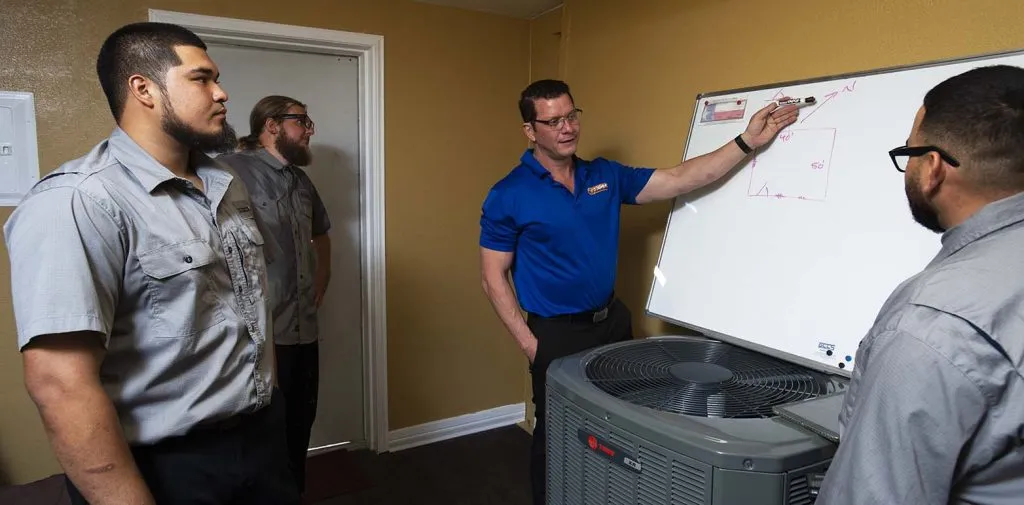
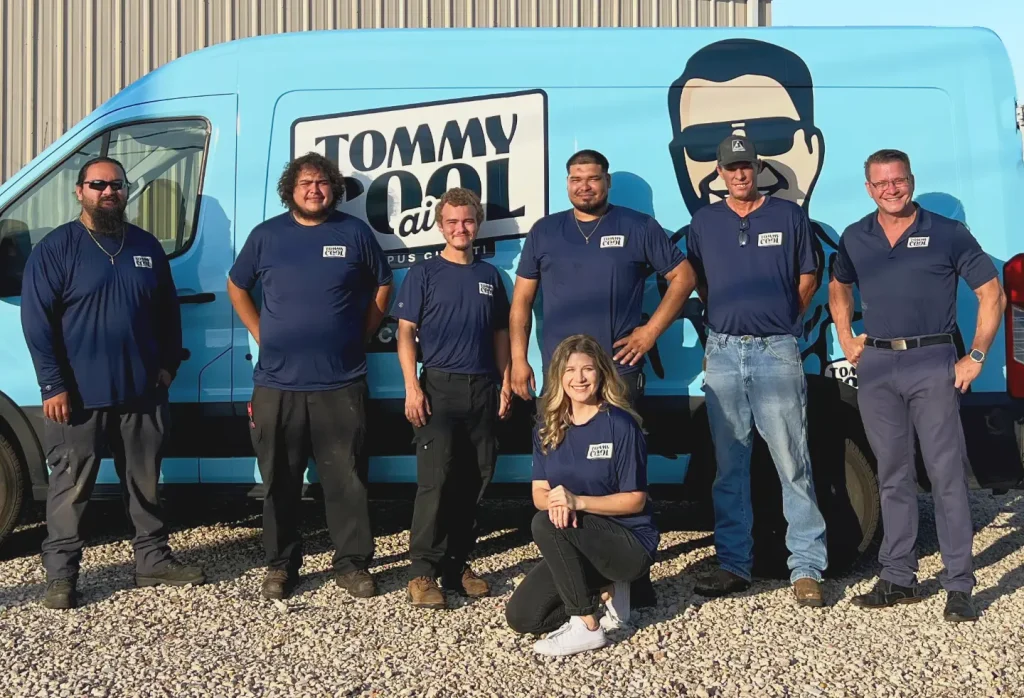
GET IN TOUCH TODAY
Get a quote. Tommy will keep you Coool.
100% satisfaction, guaranteed!
REVIEWS
WHAT CORPUS CHRISTI CUSTOMERS
SAY ABOUT TOMMY COOL AIR
Troubleshooting Steps for Common AC Problems
Facing AC issues can be frustrating, especially when you’re not sure whether a service call is necessary. Before reaching out for professional help, consider these DIY troubleshooting steps:
1. Examine and Replace Air Filters
Dirty or clogged air filters can severely impact your AC’s performance.
- Tip: Regularly check and replace filters every 1-3 months, especially during peak usage times.
2. Adjust Thermostat Settings
Ensure your thermostat is set correctly and functioning as expected.
- Settings Check: Verify that it’s set to “cool” and that the temperature setting is lower than the room temperature.
3. Inspect the Circuit Breaker
Sometimes, the solution might be as simple as a flipped switch in your electrical panel.
- Action: Find your home’s main electrical panel and ensure the circuit breaker for the AC unit is in the “on” position.
4. Clear Debris from the External Unit
An untidy condenser can hinder airflow and reduce efficiency.
- Maintenance Tip: Periodically clean the area around your outside AC condenser, removing any debris, dirt, or obstructions.
5. Ensure Indoor Vents are Unobstructed
Blocked vents can disrupt airflow and cause uneven cooling.
- Quick Check: Walk through each room and confirm that all indoor vents are open and free from obstructions.
If these steps don’t solve the problem, it may be time to contact a certified HVAC technician for further assistance. Remember, many repair services are accessible 24/7 and can assist even on weekends and holidays.


